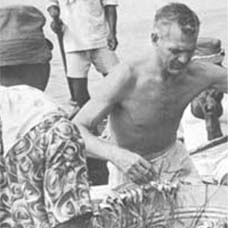
Double Homecoming: American Indians with African Roots Return to the "Rice Coast" By Joseph Opala
Double Homecoming
American Indians with African Roots Return to the "Rice Coast"
DIASPORA
By Joseph Opala
TWO BLACK SEMINOLE men from Oklahoma were among the 'Gullah delegation' of 13 African Americans that recently made an historic homecoming visit to Sierra Leone (West Africa, December 25).
The 'Black Seminoles' were escaped slaves, who waged the longest and fiercest struggle against slavery in American history. In the 19th century they fought the US Army to a standstill, winning their freedom and the respect of their adversaries. Although they deserve a significant place in US history, they have been almost totally ignored by American scholars. The visit to Sierra Leone marks the first time that this important group of African Americans have been recognized and honored by an African nation.
President Momoh invited the black Seminole leaders, Lance and Lawrence Cudjoe, to join in the homecoming of Gullah people to Sierra Leone in late November. The Gullahs are from South Carolina and Georgia, where American rice planters preferred to use slaves from Sierra Leone and neighboring parts of the West African 'Rice Coast.'
But not all the Gullah slaves remained on the plantations. Some escaped south into Florida which, in the 1700s, was virtually an empty tropical wilderness. Although the Spanish claimed Florida at that period, they exerted almost no political control. The Gullah frontiersmen built prosperous villages based on rice agriculture and raised several generations of children in freedom. They were joined by American Indians from several tribes, also escaping south, with whom they maintained friendly relations. But it was the Africans' knowledge of tropical agriculture, especially rice, which enabled both groups to survive in Florida. The Gullah and Indian runaways were collectively called 'Seminoles' from a Spanish word meaning 'wild' or 'untamed.'
As American settlement moved south, there was a series of skirmishes with the Seminoles, culminating in a full-scale war from 1835 to 1842. This 'Second Seminole War' has been misinterpreted by US historians as the longest and hardest of America's 'Indian Wars'. But the blacks were the backbone of Seminole resistance in Florida, and the US Army commander, General Jesup, called the conflict, "a Negro and not an Indian war." A US congressman of the period said the black Seminoles were "contending against the whole military power of the United States." In a tropical environment similar to that of West Africa the black Seminoles were able to live a free and prosperous life for generations, and to resist slavery on a massive scale without parallel in American history.
General Jesup was unable to defeat the Seminoles, who subjected his troops to punishing hit-and-run attacks, before disappearing into the wilderness. He negotiated an agreement whereby the blacks and Indians would emigrate west voluntarily, keeping their property and their weapons. But when the US government sold the black Seminoles, who had come in freely under the agreement, as slaves in order to pay off the war debt, Jesup and his troops refused, turning away the slave buyers at gun point, and defying their superiors. The soldiers feared that the black Seminoles would escape back into the wilderness and renew the fighting or, if enslaved, foment insurrections on the plantations. About 1840, the Army escorted the black Seminoles and their Indian comrades from Florida over 1,000 miles west to then unsettled territory, which is today the state of Oklahoma.
President Momoh's guests, Lance and Lawrence Cudjoe, are both members of the tribal council of the Seminole Indian Nation of Oklahoma, which is still a mixture of blacks, now called 'Seminole Freedmen' and Indians. The twin brothers are a retired lawyer and college administrator. Lance suffered a stroke in 1987, and came to Sierra Leone in a wheelchair, accompanied by his wife. President Momoh commented on Lance's courage and determination in making the long journey and some likened it to the spirit of his ancestors in Florida. The Cudjoe brothers noted that newspaper reporters in Oklahoma were surprised at the honor President Momoh extended them. None of the local newsmen were even aware of the existence of the black Seminoles, so neglected are they in American history. When receiving personal gifts from the President on his last day in Sierra Leone, Lance Cudjoe said, "You haven't heard the last of the Seminole Freedmen."
Some Sierra Leoneans have already begun to spread the fame of their black Seminole 'kinsmen' within their own country. The Freetong Players, a popular theatre group, is now featuring 'The Black Seminole Song', and is planning a full-scale drama production on the Seminole Wars. Some Sierra Leonean educators are also proposing a children's book on the Gullahs and black Seminoles for the primary schools.
As for the Cudjoe brothers, they found much in Sierra Leone to make them feel as 'kinsmen'. For them, it was a double homecoming — a return to Africa and the first meeting between black Seminoles and Gullahs since the slaves escaped into Florida 200 years ago.
From West Africa, 22-28, January 1990, p. 97.









